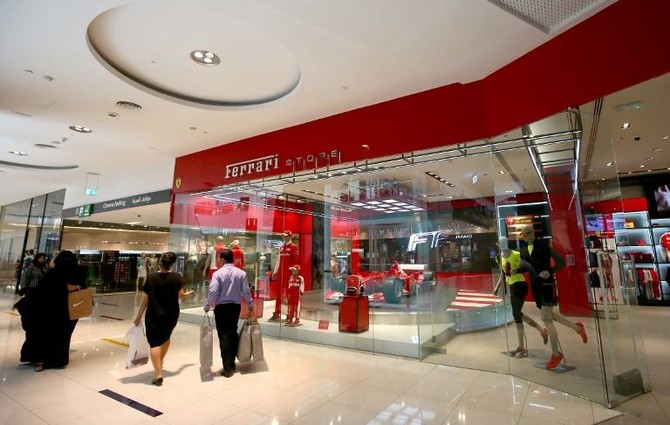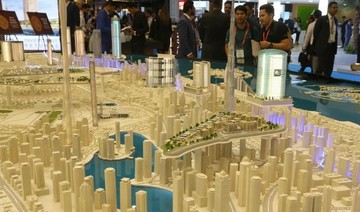DUBAI: Economic growth in the energy-rich Gulf will recover in 2018 from a contraction last year but remains vulnerable to volatility in crude oil prices, the IMF forecast on Tuesday.
The global lender predicted that an overall energy price recovery from 2015-2016 lows would spur the economies of the six-nation Gulf Cooperation Council to grow by 2.4 percent in 2018 and 3.0 percent in 2019, after a contraction of 0.4 percent last year.
Grouping Bahrain, Kuwait, Oman, Qatar, Saudi Arabia and the UAE, the GCC states together pump over 17 million barrels per day and depend heavily on crude revenues.
But “the growth outlook for oil exporters remains subject to significant uncertainty about the future path of oil prices,” the IMF said in its Regional Economic Outlook for the Middle East and North Africa (MENA).
After their earlier extended recovery, oil prices have shed a fifth of their value in just one month, with Brent crude trading near its lowest price since April.
Growth in non-GCC oil exporters in MENA, which includes Iran, Iraq, Algeria and Libya, is projected to slow to 0.3 percent in 2018, from three percent the previous year, and pick up modestly to 0.9 percent in 2019, the IMF said.
“This largely reflects the expected impact of the re-imposition of US sanctions on Iran, which is likely to reduce Iranian oil production and exports significantly over the next two years at least,” the IMF said.
It projected Iran’s economy to shrink by 1.6 percent this year and 3.6 percent in 2019.
For oil-importing countries in MENA, growth is expected to continue at a modest pace of 4.5 percent in 2018, before dropping back to four percent next year, the IMF said.
This level of growth is not sufficient to create the required jobs for a region marred by instability and civil strife, it said.
Oil revenues for MENA exporters have increased by about $260 billion over the period 2016 to 2018.
This has mostly been due to a price rise generated by production cuts in nations belonging to OPEC, as well as non-OPEC producers.
The current account balance will turn from a deficit into a surplus and overall budget shortfalls will decline, the lender said.
The IMF urged GCC states to continue with and expand reforms, welcoming the imposition of value-added tax by Saudi Arabia and the UAE.
It also called on GCC countries to impose corporate and personal income tax in order to diversify their revenue streams.
IMF: Gulf economy recovering but faces oil volatility
IMF: Gulf economy recovering but faces oil volatility

- ‘The growth outlook for oil exporters remains subject to significant uncertainty about the future path of oil prices’
- Oil revenues for MENA exporters have increased by about $260 billion over the period 2016 to 2018
New Saudi draft project to regulate direct market entry of listed companies’ subsidiaries

RIYADH: The Saudi Capital Market Authority has launched a draft regulation for the direct listing of subsidiaries of companies already listed on the main market, inviting stakeholders to provide feedback over a 30-day period, according to a statement issued today.
The proposed framework aims to allow subsidiaries of main-market companies to list their shares directly on the main market without undergoing an initial public offering, thereby shortening timelines, streamlining procedures, and reducing the costs associated with listing on the Saudi stock market.
It also seeks to create more investment opportunities in the Saudi financial market, contributing to market depth and product diversification, while maintaining high levels of transparency and protecting investors’ rights.
The proposals enable the issuer and its financial advisor to share information about the company and its financial statements with a select group of potential investors before obtaining CMA approval for the share registration request, allowing them to assess their interest in a direct listing on the main market.
They also allow a specific group of licensed financial advisory firms to prepare research and financial reports, provided these are not published before CMA approval.
The proposed framework emphasizes the importance of proper disclosure by setting out requirements for registering shares on the main market, including submitting a registration document to the CMA.
It also specifies the information that must be included in the registration document, such as the method for determining the reference share price and the risks associated with this method.
Under the draft regulation, securities offering rules, ongoing obligations, and the CMA’s glossary of terms and regulations will be updated to allow this type of listing.
This approach is expected to bring multiple benefits, including maximizing the overall value of the main market with lower risk by listing companies that have greater knowledge and experience of market regulations, as well as deepening the market by increasing the number of listed companies across multiple sectors.












